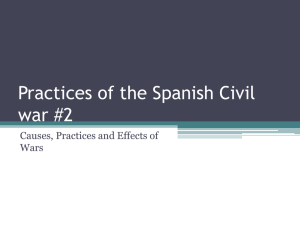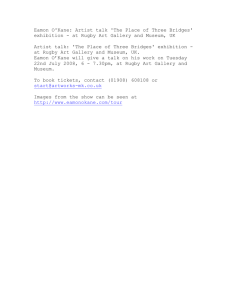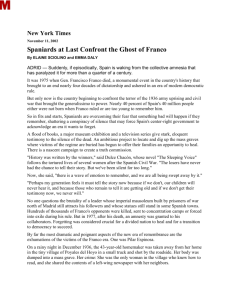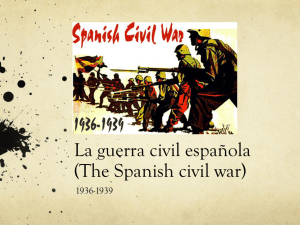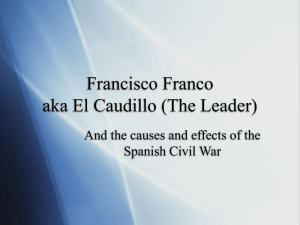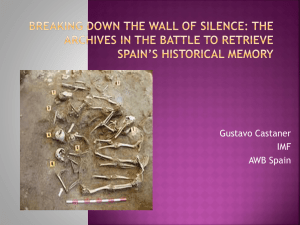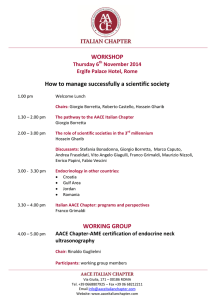Full Story - The 9/11 Project
advertisement
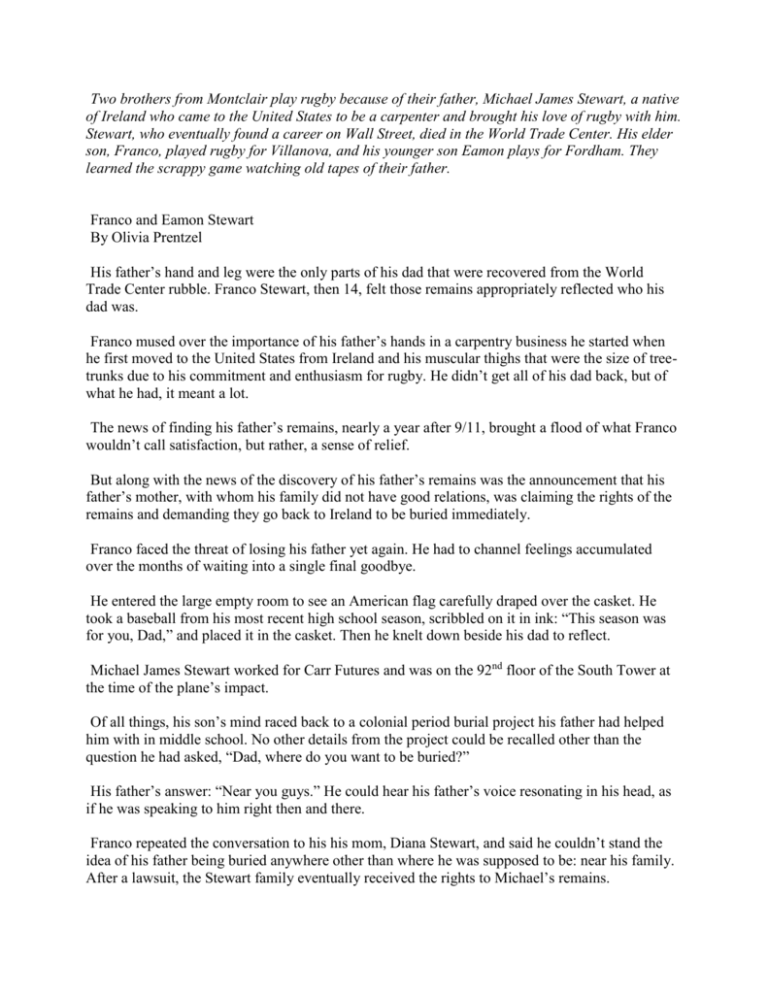
Two brothers from Montclair play rugby because of their father, Michael James Stewart, a native of Ireland who came to the United States to be a carpenter and brought his love of rugby with him. Stewart, who eventually found a career on Wall Street, died in the World Trade Center. His elder son, Franco, played rugby for Villanova, and his younger son Eamon plays for Fordham. They learned the scrappy game watching old tapes of their father. Franco and Eamon Stewart By Olivia Prentzel His father’s hand and leg were the only parts of his dad that were recovered from the World Trade Center rubble. Franco Stewart, then 14, felt those remains appropriately reflected who his dad was. Franco mused over the importance of his father’s hands in a carpentry business he started when he first moved to the United States from Ireland and his muscular thighs that were the size of treetrunks due to his commitment and enthusiasm for rugby. He didn’t get all of his dad back, but of what he had, it meant a lot. The news of finding his father’s remains, nearly a year after 9/11, brought a flood of what Franco wouldn’t call satisfaction, but rather, a sense of relief. But along with the news of the discovery of his father’s remains was the announcement that his father’s mother, with whom his family did not have good relations, was claiming the rights of the remains and demanding they go back to Ireland to be buried immediately. Franco faced the threat of losing his father yet again. He had to channel feelings accumulated over the months of waiting into a single final goodbye. He entered the large empty room to see an American flag carefully draped over the casket. He took a baseball from his most recent high school season, scribbled on it in ink: “This season was for you, Dad,” and placed it in the casket. Then he knelt down beside his dad to reflect. Michael James Stewart worked for Carr Futures and was on the 92nd floor of the South Tower at the time of the plane’s impact. Of all things, his son’s mind raced back to a colonial period burial project his father had helped him with in middle school. No other details from the project could be recalled other than the question he had asked, “Dad, where do you want to be buried?” His father’s answer: “Near you guys.” He could hear his father’s voice resonating in his head, as if he was speaking to him right then and there. Franco repeated the conversation to his his mom, Diana Stewart, and said he couldn’t stand the idea of his father being buried anywhere other than where he was supposed to be: near his family. After a lawsuit, the Stewart family eventually received the rights to Michael’s remains. And so his father was buried on a hill overlooking a field, in a cemetery down the road from the family’s home in Montclair. All it took to get him there was the voice of his son. That was enough. Franco, now 23, and at a financial firm, Newedge USA in Rockefeller Center, and his brother, Eamon, 21, a student at Fordham University, think about their father every day. Franco’s parents divorced in 1998, his mother remaining in Montclair and his father moving to Brooklyn. Though the memories of playing football in the snow in Prospect Park and trips to the bowling alley during his father’s visitation periods brought a grin across his face, Franco had trouble feeling anything but numb towards anything he saw on the news. “I feel numbness more than anger, fear, sadness towards a lot of things and that even goes beyond 9/11,” he says. “Tragedies that happen every day over the news, things overseas, the wars that we are in; I want to feel something more than I do but sometimes I can’t get myself to feel anything,” Franco admitted. At first it was strange, not being able to feel. But after experiencing every emotion since his father’s death, Franco thought it perhaps it was his way of coping. He was watching a movie and just about to go to bed on May 1 when a text from a co-worker alerted him to turn on CNN to watch President Obama’s speech regarding the death of Osama bin Laden. The news caught him off guard. “There were waves of emotions pulsing through me and it was… weird to feel, anything at all in regards to this thing,” says Franco. “I thought that there is nothing else to feel -- I had already experienced it -- but it was kind of weird to have a sensation and an attachment to that kind of news. He said the words slowly as if he were still in shock about his reaction. He felt his chest become tighter, similar to the feelings you get right before you are going to start crying. But he never did. His face went flush as he sat there, feeling the pressure within his chest come and fade away. It came back. Then it faded away. Then came back again. And faded away. The cycle continued as he watched the news coverage of people celebrating bin Laden’s death on the streets. As he turned on his car radio the following morning, he was hoping to listen to the Phillies’ game. But after every commercial break, his drive was interrupted with the incessant audio clip of celebratory chanting of “U.S.A.,U.S.A.” “It was weird to feel constantly, even though I heard it [celebratory chanting] like 10 times, but I did. It was a sense of pride, but also the fact that I was actually feeling something was a sensation in itself.” During one of the first anniversaries following Sept. 11, 2001, Franco did everything he could to have “the most typical day.” His mother called him, hoping to share the day with him and his brother. “She kind of enlightened me when she said it’s OK to have a normal day while still paying respect to what it is, what it was, what it should be, as a family,” says Franco. This anniversary, similar to anniversaries in the past couple of years, Franco will be taking off from work to share time with his mother and brother. “It’s not a day to be completely absorbed by feeling sorry for ourselves or being depressed about it or just observing it,” he says. “It’s just that’s the day we take off and respect what it is.” As he takes time to respect the life of his father, Franco will be wearing his dad’s beloved blazer. The blazer, though not significant in of itself, has an Irish cross pin on the left chest that never comes off. It’s like his father is with him while wearing it, Franco says. What also stays with the blazer, in the left chest pocket, is a rusty, curled cable-wire that Franco found during the only time he visited Ground Zero at one of the 9/11 memorials, years ago. He picked it up and immediately put it in his pocket. It has not moved since. From his interview perch, Franco glanced at the sparkling skyline of New York City through his bedroom window that spans his entire wall. “Having a physical remnant of that area was important to have for me. This was the one thing that wasn’t a piece of dirt.” As the horror of 9/11 recedes and emotional wounds heal, Franco and his brother Eamon focus on the good times and remember their father in more personal ways. Michael Stewart, born in Belfast, Ireland, was playing rugby on Columbia University’s Old Blue alumni rugby team until the time of his death and had grown up playing the sport. His father had attended University of Stirling in Scotland and it was there that he had made the “All-Uni’s,” allstar team collaborative of all universities in Scotland. He was also in Old Blue’s Hall of Fame. Eamon, who plays rugby for Fordham, remembers watching old tapes of his father playing. Seeing his dad play taught him the game, but he expanded on what his father started, he said. “It’s kind of like a big thing because I play the same position he did, and I wear the same number, which is kind of nice,” Eamon says. Franco thought the reason he joined Villanova University’s rugby team was because of his father. But before he could finish his thought, he declared that his dad was the sole reason for playing. “I felt like I was representing our family in that regard, because apparently he was excellent,” Franco says with pride. Franco’s memories of his college rugby seasons intertwine with memories of his father. “Before every single game, I thought about him. I would actually go to the back end zone of whatever side we were starting from, take a knee and just have a few moments to myself where I would think about him, ask him to watch over me and just kind of gather myself around that just to prepare myself for the game.” He found it very calming. It took him a while to consider what his father would actually say to him if he were standing on the sidelines. He said he supposed his dad, expecting the most from his son. would tell him to stop walking on the field! The memory is followed by a laugh. It was especially hard for Franco at the conclusion of his last Villanova rugby game of the regular season versus Bloomsburg University. It really hit him that his dad never got to see him play. “Once the game ended, I went off my myself to the far side of the field and completely broke down. I was bawling my eyes out -- he never got to see me play. I always associated him with rugby as that was his sport. It was what he did and just thinking about him never having that opportunity. It hadn’t even crossed my mind at 13 years old to play rugby at any point in my life. It just crushed me.” As he spoke, his palm grasps his chest. His hand touches the black outline of a drawing of his father playing rugby that is imprinted on the white T-shirt he is wearing. Though rugby was a sport both Stewart brothers became involved in only after their father’s death, their dad, their fondest memories are playing football with their dad. “Eat dirt, buddy!” their dad used to yell as he would playfully push his sons to the ground in a game of football. Franco found it ironic for his Irish-born father to be such a huge American football fan, but he admits that one of the best things they did for fun was play football: Dad versus Eamon and Franco. They both can recall one game as though it were yesterday. “It was snowing, and we were playing football outside, and he was just tossing us all over the place and there is nothing better than getting hit in snow,” Franco notes. When they visited their dad, it was always the two brothers together. “There wasn’t time enough to make friends with people in the area where my dad lived or anything like that,” Franco says. “It was just myself and Eamon… and my dad.” Eamon and Franco both admit they are best friends. “We weathered a storm together, and we know that if we can survive that, that there a plenty of things that we can survive, and we’ll still have each other,” Eamon says. However, both are certain that they would have been close regardless of their loss of their father. It was natural that as they grew older, they would grow closer, Franco said. Eamon agrees. “We would have been best friends otherwise.” Their connection gives them the opportunity to have someone to talk to whenever they need to, especially in regards to when Sept. 11 pops up in the news. Eamon finds talking to his brother as a sort of therapy. Referring to the New York City mosque controversy last summer, Eamon recalls the public “obsessing over it” because of the intense feelings of the families and victims. “I remember thinking,” he says, “that nobody really knows how any of [the family members] feel or at least how I feel. [The issue] is being shoved in our face, but it’s not reciprocal. and we don’t have a way to respond to what they are saying.” Talking with Eamon helps Franco as well. “I can’t say I have ever felt alone, and that’s predominantly because of Eamon.” When they were younger, Franco and Eamon didn’t want to be treated any differently due to their father’s death, yet they found it hard to avoid. “In my school, I was the 9/11 kid,” Eamon remembers from when he returned to Glenfield Middle School a few months after Sept. 11. Franco found his classmates acting especially nice to him upon his return to classes at Montclair High School. To help cope, in November 2001, their mother enrolled both of her sons in a grief camp called Comfort Zone. At the camp, Eamon and Franco were able to share their feelings and memories about their dad with other kids who had lost a parent in the attacks. “That camp was probably the most helpful, proactive thing we did in terms of the healing process and therapy,” Franco says. Eamon said that the camp helped them process their grief. Shortly after the attacks, Eamon was unable to talk to anyone about the loss of his father. “I think the camp started getting that going and helped me get comfortable. Especially being able to talk to my brother in particular,” Eamon says. Eamon wished he could have known what his relationship with his father would have been like now. Not being able to have an adult conversation with his father is something he finds lacking in his life. “When you’re 11 years old, [divorce] is something you have no understanding of and it’s that kind of thing now that I’d like to talk to my father about,” he said. “Obviously if it’s a divorce, both sides are going to be completely biased, and I only ever heard one side.” Growing up with their mom made them realize a lot. Eamon said that in the past 10 years, he has gained more appreciation for his mom. While they saw other children of divorce have to move to smaller homes or have to cut back, their lifestyles didn’t change much after the divorce and they give credit to their mother for that. “It took me a long time to notice that none of that had happened to my own family, and that the ship kind of held after the divorce and after my father had died,” Eamon says. “My mother worked hard to preserve the things that we had so that we could keep leading the life that we were leading.” Eamon and Franco admit they don’t have much patience with people who can’t sweat the small stuff in life. “For a long time all I could think is how petty all these problems are,” he says. “Not that I have suffered more than anybody else, but there are people, I guess, a gust of wind comes and they blow over. “For a long time I just felt angry about that. You don’t realize how easy you have it and how good you have it. If I ever felt any lingering anger, it was at those kind of people. “ Franco finds himself in the same position. “So often I’ll think about it in the perspective that ‘Well, how much does this really matter?’ And it won’t. So I can’t find myself actually caring.” Eamon also doesn’t want people to feel sorry for him or special treatment because his father was killed in the attacks. “Because my dad died in a public way, it’s almost like people expect that I feel entitled to something and I don’t,” he said. But that is something he has come to embrace. Ten years ago, different things were on his mind. “I was just thinking I miss my dad. I wasn’t thinking about the way other people would treat me or behave around me. All I was thinking was that I miss my father. And that was it. I can’t say I was thinking much about the bigger world,” he recalls. Franco remembers the day of his father’s funeral. At 14, after all the legal battles were done, he felt the responsibility of burying his father. Although there were others who carried the casket that day, Franco felt it was his weight alone. He held the front end of the casket and slowly lowered it on canvas straps through the two steel bars at the side of the hole in the ground. While he tried with all his might to remain stoic, tears streamed down his face. “I felt that it was appropriate in my young mind that this is my dad, this is part of my job, to bury him appropriately, and do it myself,” Franco says. Olivia Prentzel, 19, is a junior at Rutgers University. She is double majoring in Journalism and Media Studies and English. She is from Oakland, N.J. Currently, Olivia is the Design Editor of Rutgers University’s daily newspaper, The Daily Targum. She is also the Editor-in-Chief of Rutgers’ branch of Hercampus.com, an online magazine designed specifically for Rutgers’ female students. EDITORS! The following information is for your use and not for publication. Author Contact: Olivia Prentzel 770 Ramapo Valley Road Oakland, NJ 07436 oliviaprentzel@gmail.com livpren@eden.rutgers.edu Home: 201-644-8339 Cell: 551-486-4185
